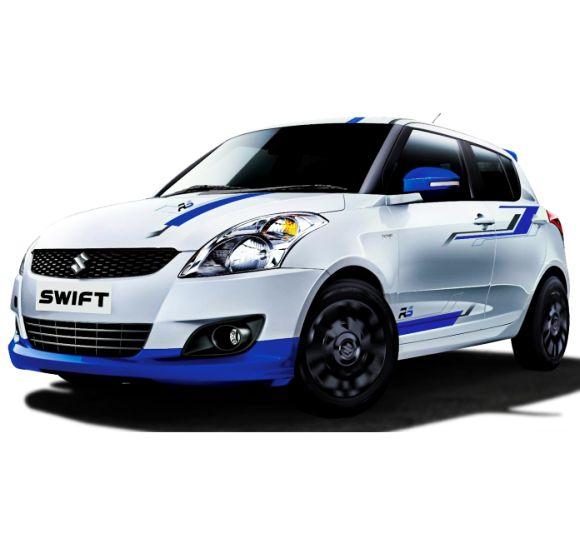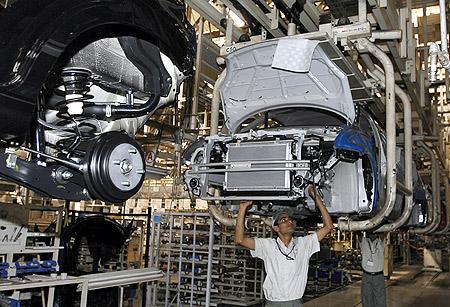 | « Back to article | Print this article |
What Suzuki's Gujarat plant means for Maruti
Maruti’s decision to give the Gujarat plant to Suzuki may not be the proverbial win-win amid concerns about costly imports and pricing.
After Maruti Suzuki announced on Tuesday that the proposed factory in Gujarat will be owned not by it (as was originally planned) but by a fully-owned subsidiary of Suzuki Motor Corporation, the company’s stock fell over 8 per cent.
It did not mean much for the market that the company had announced a healthy 36 per cent growth in profit for the quarter ended December 2013. Analysts and brokers hammered the share because the move was perceived to harm the interests of the small shareholders and raised serious corporate governance issues.
Yet, just a day later and after a long and heated analyst call with the Maruti Suzuki management, the market changed its mind. The Maruti Suzuki share recovered most of the previous day’s loss and closed 7.11 per cent up on Wednesday.
IDFC Securities said the stock was an “outperformer” and “the actual impact of the deal will be known only in 2017-18 when the plant starts commercial production”. Religare put the “buy” tag on the stock as the management had partially answered its concerns.
Click NEXT to read more...
What Suzuki's Gujarat plant means for Maruti
So, should minority shareholders worry or not? Many experts feel Suzuki is looking to exercise stricter control over its core business of making cars, and that may have prompted it to house the Gujarat factory in the new fully-owned subsidiary, Suzuki Motor Gujarat. (Suzuki owns 56.2 per cent of Maruti Suzuki.)
This way, it will have greater control over product development. Under the new arrangement, the new factory will produce cars which will be sold by Maruti Suzuki. The obvious question is what is the price at which Suzuki Motor Gujarat will sell to Maruti Suzuki?
Maruti Suzuki has made it clear that the new company will sell the cars at cost price and not at a profit; so Suzuki will not make any return on its investment. The price will be determined on an “arm’s length” basis.
And the components will be sourced by Maruti Suzuki. So, there is no way profits will get transferred from widely-owned Maruti Suzuki to closely-held Suzuki Motor Gujarat.
Click NEXT to read more...
What Suzuki's Gujarat plant means for Maruti
On the other hand, Suzuki, which earns less than 1 per cent on its cash reserves of Rs 25,000 crore (Rs 250 billion) in Japan, will enhance its returns.
Click NEXT to read more...
What Suzuki's Gujarat plant means for Maruti
Costly imports
Yet, it might not be so simple. Experts say it won’t be easy for the new subsidiary to justify the price of imported components it will buy from Suzuki because it intends to sell the cars to Maruti Suzuki at cost price. “This is not the case when the components are imported by Maruti Suzuki,” says a transfer pricing expert.
“It will be difficult for the subsidiary to justify the price of imported components unless the components are bought by Maruti Suzuki and then given to the subsidiary.” Bhargava says the problem is not unique to the new subsidiary and such transfer-pricing questions are asked even now to Maruti Suzuki when it imports components because these are related-party transactions. Tax experts say that under the domestic transfer pricing rules, there is no problem in the deal as the only thing which is scrutinised is expenditure and not income. As the new subsidiary will sell the cars at cost price and the profit margin will be booked by Maruti Suzuki on which it will pay taxes, there is no loss of revenue for the government. However, SR Dinodia & Co Partner Pallavi Dinodia says: “In time, income may also be included in the domestic transfer pricing rules. In that case the Gujarat subsidiary will face serious scrutiny as it has to justify why it is not making profits and at what price would it sell the same cars to third parties.”
Click NEXT to read more...
What Suzuki's Gujarat plant means for Maruti
Tandon raises some other key issues. For one, if the market drops, who will curtail production: Maruti Suzuki or the 100 per cent subsidiary? Obviously, the decision in such a scenario will be taken not by Maruti Suzuki but by Suzuki. This is yet another decision that is set to slip out of the hands of the Maruti Suzuki shareholders.
“If so, Suzuki will have free access to land that is partly owned by the 44 per cent non-promoter shareholders of Maruti Suzuki,” says Institutional Investor Advisory Services. Maruti Suzuki says that the lease rentals will not be high as that will only increase the cost of the car, something it can ill-afford in an extremely competitive market. Tandon also questions whether the cost of production would be cheaper in the 100 per cent subsidiary.
“After all, it will have its own legal and human resource team and cannot use the infrastructure of Maruti Suzuki. This will only raise the cost,” Maruti Suzuki says it will offer its employees the option to shift to Gujarat.
Click NEXT to read more...
What Suzuki's Gujarat plant means for Maruti
The labour link
Industry watchers say the move may have also been prompted by Suzuki Chairman Osamu Suzuki’s growing concern with labour problems in the Manesar-Gurgaon region, where Maruti Suzuki’s two factories are located. Frequent and violent strikes have caused the company significant loss of production in the recent past.
“Foisting the Japanese method of labour management on Manesar has been a disaster. So it is quite tenable that Suzuki wanted Gujarat to have nothing to do with the existing unions and it prefers to deal with the unions directly rather than through the Indian company,” says a former executive of Maruti Suzuki.
The new deal has caused observers to debate the real cause of the move. “The problem is that whenever you have such a structure there is always the suspicion that the price mechanism is not transparent, especially when you know that Suzuki has tried to get greater control and extract more cash for its balance sheet in Japan,” says the former executive quoted above.
Click NEXT to read more...
What Suzuki's Gujarat plant means for Maruti
After legal advice, it was found more prudent to merge it into Maruti Suzuki to avoid questions of transparency. However, it was able to create a 70/30 partnership for powertrains which was recently merged into Maruti Suzuki.
The royalty payment to Suzuki has jumped nearly fivefold from Rs 493.1 crore in 2007-8 to Rs 2,450 crore in 2012-13. Royalty payment accounts for 5.8 per cent of Maruti Suzuki’s net sales in 2012-13, up from a mere 2.8 per cent in 2007-8.
More strikingly, it constitutes a staggering 47 per cent of Suzuki’s profit after tax, say analysts. The latest move queers the pitch further.







